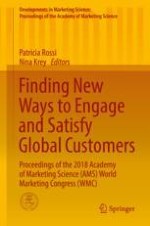2019 | OriginalPaper | Buchkapitel
Emotional Aspects of Marketing: Theory and Methods: An Abstract
verfasst von : Michael Basil, Paul Bolls
Erschienen in: Finding New Ways to Engage and Satisfy Global Customers
Aktivieren Sie unsere intelligente Suche, um passende Fachinhalte oder Patente zu finden.
Wählen Sie Textabschnitte aus um mit Künstlicher Intelligenz passenden Patente zu finden. powered by
Markieren Sie Textabschnitte, um KI-gestützt weitere passende Inhalte zu finden. powered by
